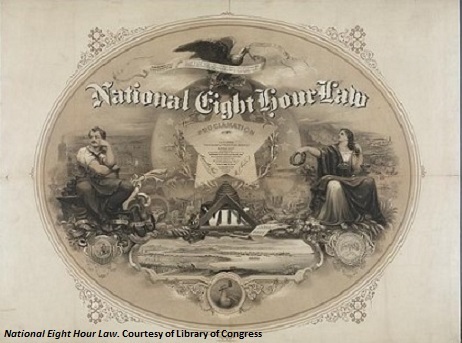Dublin Core
Title
Description
The reality of an eight-hour workday remains elusive for many Utah workers, but it is still considered the national standard, and one we take for granted. Learn how Utah became the first state to adopt the eight-hour workday.
During the late nineteenth century, workers across the United States were agitating in favor of the eight-hour workday. Eight hours of sleep, eight hours of work, and eight hours for what we will, they said, that is what we deserve. But it was a strategy first developed here in Utah that made it possible for labor activists across the country to secure for the country what we now consider the standard workday.
At the time, courts typically held that eight-hour legislation was illegal because it restricted an individual’s right to negotiate his or her own work hours. This employer-friendly analysis underscored the idea of individualism while ignoring the inability of most employees to improve their own working conditions without calling on their co-workers to speak collectively. But when Utah began its bid for statehood in the early 1890s, labor activists saw an opportunity to bypass the courts altogether. Why not make the eight-hour workday part of the state’s founding constitution?
Fortunately, the bid for statehood also motivated the LDS Church to loosen its grip on politics and encourage its members to vote without religious direction. Worried that labor unions posed a threat to its political power, the church had previously opposed union-friendly candidates. But now Mormon and non-Mormon unionists could join to pursue common goals.
So, Utah’s unionized workers stuck together and backed candidates – regardless of party or religious affiliation – who were willing to support key pro-worker provisions to the state’s 1895 constitution. Not only did they win the eight-hour workday, but they helped Utah’s first legislative session to reform woman and child labor practices, ban convict labor, establish an arbitration board, and provide compensation for job-related injuries. Three years later, the U.S. Supreme Court heard a legal challenge to Utah’s eight-hour workday decision – and upheld it.
That victory led unions in other states to submit their own legislation based on the Utah law. Securing the national eight-hour workday has had profound consequences for generations of Americans.
Creator
John Christensen for Utah Humanities © 2017
Source
Image: Eight Hour Work Day. This poster promotes the idea of an eight-hour work day, one of the perennial concerns of the labor movement. Courtesy of Library of Congress.
_______________
See John P. Enyeart, “’The Exercise of the Intelligent Ballot’: Rocky Mountain Workers, Urban Politics, and Shorter Hours, 1886-1911,” Labor, Fall 2004, Volume 1, Number 3, pp. 45-70.

